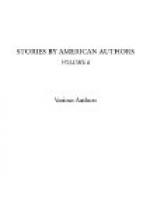He has a prominent characteristic, which always attracts attention at first sight. This is the shape of his head, which is immensely large in proportion, very bald, and so abundant in various queer, knobby excrescences about the forehead and sides, and so unnaturally long and level on top, that for some time after I made his acquaintance I could never see him without finding myself forming absurd conjectures as to whether his cranium and the hydrostatic press could ever have become acquainted at some early period of his life; and so strong is this association of ideas that, even now, his sudden appearance invariably suggests to me the study of natural philosophy. Poor fellow! his chagrin was great when this peculiar conformation of his skull was first brought to his notice. He had been telling me for some time past of the “splendid piccha” he had had “took,” and I had been promised a sight of it just as soon as it arrived from the photographer’s. I confess I had not been sanguine as to the result, although I knew a handsome portrait was confidently expected by the sitter. One morning he deposited the photograph before me.
“Hello!” I cried, taking it in my hand; “here you are, hit off to the life.”
“Do’ say that, Mist’ Dunkin, do’ say hit, seh,” he replied, in a tone of deep mortification. Then, catching a glimpse of the picture, his ire broke forth: “Nevvah wuz like me in de wueld,” he cried, in an elevated key; “nevvah wuz ha’f so ugly ez that. I’m—I’m a bettah-lookin’ man, Mist’ Dunkin. Why, look at de color of de thing,” contemptuously. “Cain’ tell de face f’om de coat I nevvah set up to be what you’d call faih-cumplectid, but disha things iss same is that thaih ink; jess iss same. My hade do’ look that a way, neitha. Naw, seh, ‘taint s’ bad ’s that.”
“Why, Thomas,” said I, “I think it a very good likeness—the complexion is a little dark to be sure, but do you know I particularly admire the head. Look at that forehead; any one can see that you are a man of intellect. I tell you it isn’t every one who can boast of such a forehead.”
“The—the ’mahk you make ’bout me, has been made ‘fo’; I may say, has been made quite frequent—quite frequent; on’y lass Tuesd’y fohtni’t, Sistah Ma’y Ann Jinkins—a promnunt membeh of ouh class (that is, Asba’y class, meets on Gay Street), Sistah Ma’y Ann Jinkins, she ups an’ sez, befo’ de whole class, dat she’d puppose de motion, dat Bro’ Thomas Wheatley wuz ‘p’inted fus’ speakah in de nex’ ‘Jug-breakin’ an’ Jaymiah’s Hamma,’ by de i-nanemous vote of de class. I’m clah to say I wuz ‘stonished; but ahta class wuz ovvva, Bro’ Moss tole me de ‘p’intment wuz made jes’ f’on de ’peahunce of my hade, ‘’Cause,’ he sez, ‘no man cain’t be a po’ speakah with sich a fine intellec’ which we see expressed in de hade of Bro’ Thomas Wheatley—but, same time, I knowed all time de fus’ motion come f’om Sistah Ma’y Ann Jinkins—she’s a ve’y good friend o’ mine, Sistah Ma’y Ann Jinkins—thinks a sight o’ me; I ’scohts heh to class ev’y Tuesd’y—ev’y Tuesd’y, sine die.”




